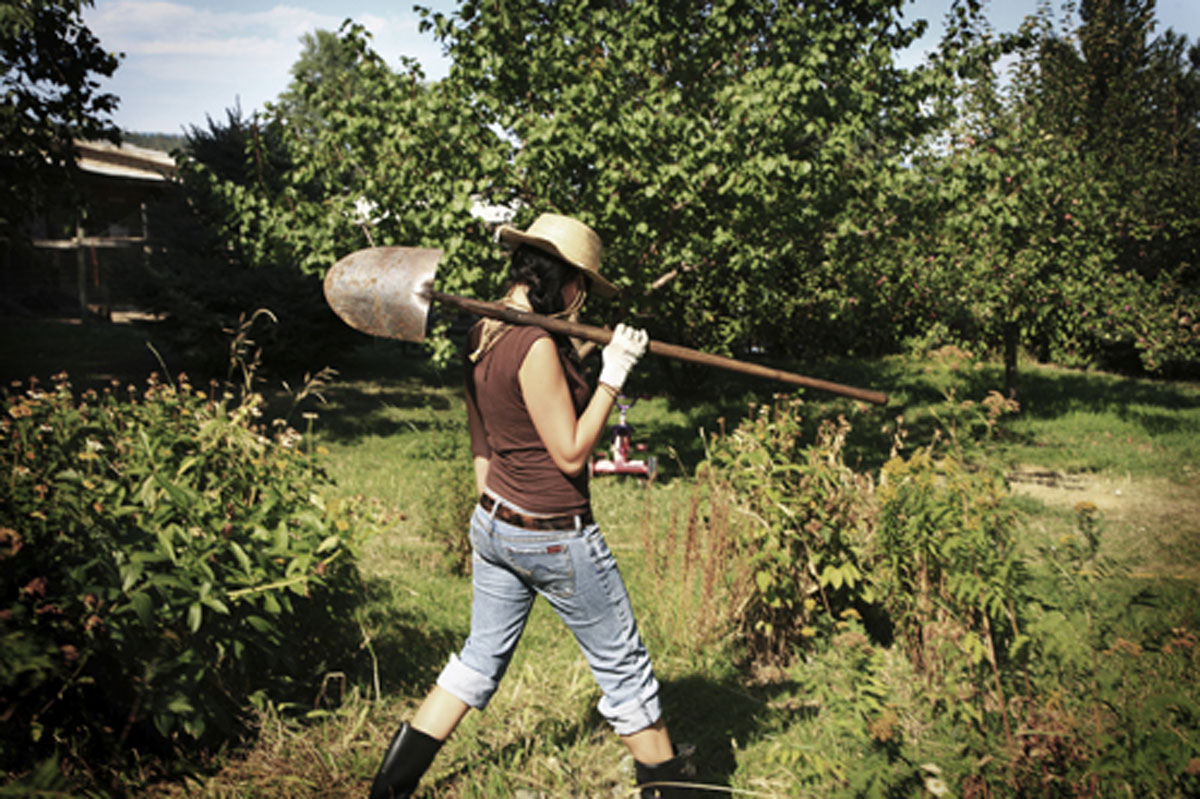Working the Land: A Tale of Two WWOOF Farms
“They ate like locusts, and worked like dogs,” says Jon Larason, farm manager of Coggeshall Farm Museum, of his immensely gratifying first foray into the world of WWOOF. “And we were happy to feed them because they worked so hard.”
WWOOF (no, not like a dog) is a volunteer-based organic farm labor movement that since its inception in the UK in 1971 has spread to more than 50 countries, touching host farmers like Larason and teaching willing workers all over the world.
Except for a $30 annual membership, the labor organization, whose acronym stands for Worldwide Opportunities on Organic Farms, runs entirely sans currency. Volunteers donate their time and sweat to
farms in exchange for room, board (usually delicious seasonal food direct from the fields), knowledge and cultural exchange. It’s about bringing people and ideas together, renewing organic, sustainable methods of growing food and restoring human relationships with rural landscapes.
The U.S. arm of WWOOF lists more than 1,600 farms across the nation on its website, yet despite the existence of roughly 1,200 farms here in Rhode Island, at the time of this writing the state has only three listed with WWOOF. Two participants are the Larasons of Coggeshall Farm Museum in Bristol and Amber Collins of Fieldsong Farm in Wakefield, both of whom began their first WWOOFing experiences in 2012 (the other, Urban Greens Farm in Pawtucket, is eyeing 2013).
A FRESH FARM PERSPECTIVE
Collins, like most, first heard of WWOOF by word of mouth. A friend had volunteered internationally and suggested Collins put her fledgling farm on the site. Before registering as a host, however, she went on the host-only forums to read about other farmers’ experi- ences with inviting strangers to their homes—a possibly threatening concept, especially when small children are on the farm. Farmers from all over sent her advice on devising an application so as to find out more about her potential visitors. According to Collins, the sys- tem has worked seamlessly. In the summer of 2012 she had eight WWOOFers, usually two at a time. They stay in a camper she has in her yard, or camp in tents if they so choose. She couldn’t be happier with the experiences.
She says, “People get to have a vacation at my house and help me too, how lucky! It’s a good way to meet interesting people from all over the world. I’m learning about the world through the WWOOFers.”
I roll up to Fieldsong Farm one dewy August morning as Collins and her newest WWOOFer, Nina Sterc, are eating breakfast with the entire Collins family. Sterc, 32, arrived the previous night from Croa- tia for a weeklong stay—her first WWOOFing experience.
“It sounded like a great program,” Collins explains as she guides Sterc and me around the property. “I don’t like to deal with the financial system. Money is such a bummer. It’s not the best thing for building relationships—people’s ideas are one of the greatest resources we have.”
Sterc, an English translator for the Croatian Ministry of Justice, chose Rhode Island because she loves visiting New England and was attracted to the prospect of WWOOFing by the beach.
“This is my first day and already Amber has taught me so much,” she says as we hack away at the bindweed that was overtaking Collins’s field—her biggest work initiative. “I wanted to try this and learn. I have a plot of land at home and I would like to learn more about gardening. This is a great way to do it, especially combining it with travel. It’s the best of both worlds for me.”
THE BEST OF HOUSEGUESTS
At Coggeshall Farm, Rhode Island’s only Early American living his- tory farm, Jon Larason and his wife and partner, Shelley, had been intrigued with the idea of hosting WWOOFers for years. But it wasn’t until this year that they created the needed room in their home and took the plunge. They ended up receiving a couple whom Jon describes as “hardcore WWOOFers.”
“Of course I had reservations; they’re going to stay in my house,” Jon Larason laughs when I ask if he had uncertainty about becoming a host. “I have to cook for them and look at them over the breakfast table. So yeah, there’s a lot of uncertainty. But we wanted to give it a try, and it worked fabulously. They were perfect houseguests. No, they were better than perfect houseguests—they were houseguests who also picked up the manure in the barn. You really can’t beat that! When my auntie comes to visit, she doesn’t clean the barn.”
Host farms don’t have to be USDA certified organic, just employ organic growing practices. Anyone over 18 can become a member of WWOOF and work, regardless of experience. Farms stays can vary from an afternoon to a full season, with each host and volunteer per- sonally negotiating the terms of their stay.
For travelers, WWOOFing is a way to deeply immerse oneself in a new setting while also getting a free place to stay. For locavore urban dwellers, it’s an incentive to get out of the city and physically con- tribute to local farms and community gardens. And for small farm- ers, it’s a way of getting free labor while helping spread the beliefs and teachings of the sustainability crusade.
For more information visit WWOOFusa.org.





